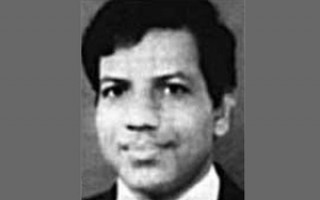Govt expects to bring back Rashed from US
The government is expecting a ‘good outcome’ in its diplomatic and legal efforts for bringing back MA Rashed Chowdhury, one of the six condemned fugitive convicts of the killing of the country’s founding president Sheikh Mujibur Rahman, from the United States, officials have said.
The government has appointed a law firm to deal with the mattes of bringing back Rashed with the Department of Justice of the United States as he sought political asylum in that country.
‘I hope the discussion with the US authorities will be fruitful ... It is possible to get legal remedy from them as death sentences are enforced in 34 states of the United States,’ law minister Anisul Huq told New Age at his office on Monday.
The Canadian government has agreed to discuss with the Bangladesh government on assessing the possibilities of handing over SHMB Noor Chowdhury maintaining local [Canadian] laws, Huq said adding, ‘we are hopeful.’
Asked if there was any progress so far that made him hopeful in bringing back Rashed and Noor, the minister said the discussion would have then been stalled if there was no progress.
‘We don’t want to disclose details right now before getting decisions from them [US, Canada],’ he said. ‘They [US, Canadian authorities] are considerate.’
Sharing detailed information might help the absconding killers to change their locations, he added.
The government has started a legal battle with filing a case on June 7 with Canada Federal Court seeking a ruling on disposing off a PRRA [pre-removal risk assessment] petition submitted by Noor, another absconding convicted killer, as a protective shield to thwart attempts for his deportation.
Canadian federal attorney general’s office submitted their deposition on August 3 in the petition filed by the Bangladesh government. Noor was also made a party in the Bangladesh government’s petition. All sides are now waiting for a date to be set by the court for starting hearing on the petition of Bangladesh authorities.
The Canadian authorities were unwilling to deport Noor as it conflicted with a 2001 Canadian Supreme Court ruling that directs the governments not to send back death sentence convicts, excepting the most exceptional circumstances.
The Bangladesh government has described the matter of Noor under the legal purview of the ‘most exceptional circumstances’ as the Canadian authorities had granted shelter to a condemned fugitive convict for assassination of a president of a country.
Bangladesh missed an opportunity to bring back Noor Chowdhury, one of the six condemned fugitive convicts of the killing of the country’s founding president Sheikh Mujibur Rahman, from Canada in late 2006 and early 2007 after the country refused to grant him political asylum.
After refusal of Noor Chowdhury’s petition for political asylum, Canadian authorities returned his diplomatic passport to Bangladesh High Commission in Ottawa and expressed intent to send him back to Dhaka, diplomats said.
There was a scope for few months to bring him back as his application for political asylum was refused by the Canadian authorities in late 2006 and at that time the death reference against him and other killers was pending with the High Court in Dhaka.
The Bangladesh mission communicated the intent of Canada to then chief adviser’s office and the foreign ministry in Dhaka, they said, but there was no response.
Getting a breathing space of couple of months, diplomats said, Noor Chowdhury, who has been living in a less populated area in Ontario province, appointed one of the best Canadian immigration lawyers and filed an application with the Office of the Canadian Attorney General in the middle of 2007.
In the application, Noor Chowdhury, a former army-officer-turned-diplomat, resorted to ‘pre-removal risk assessment’ provision seeking permission to stay in Canada claiming that he would face death penalty on his return to Bangladesh.
Noor Chowdhury’s application is still pending with the office the Canadian Attorney General, who is also the justice minister of the country.
Mujib was assassinated along with all but two of his family on August 15, 1975 at his Dhanmondi house in Dhaka by a group of army personnel. His daughters – Sheikh Hasina, now the prime minister, and Sheikh Rehana – survived the massacre as they were abroad.
The six fugitive convicts are Khandaker Abdur Rashid, Shariful Haq Dalim, MA Rashed Chowdhury, SHMB Noor Chowdhury, Abdul Mazed and Moslem Uddin.
The government is yet to get any specific whereabouts of four of six condemned fugitive convicts even after about eight years of the execution of five convicts in 2010.
Rashid, Dalim, Mazed and Moslem were constantly changing their locations with using foreign passports, diplomatic sources said adding that Bangladesh embassies have been in contact with some countries where the killers might take shelter.
Five of the 12 condemned convicts were hanged in 2010 and six had gone in hiding abroad to avoid executions. The prison authorities hanged five of the convicts – Syed Faruk Rahman, Sultan Shahriar Rashid Khan, Muhiuddin Ahmed, Bazlul Huda and AKM Mohiuddin Ahmed – on January 27, 2010, a year after the Awami League-led alliance government assumed office.
One of the killers, Abdul Aziz Pasha, reportedly died in Zimbabwe and the government collected certificate about his death from the country.
News Courtesy: www.newagebd.net











